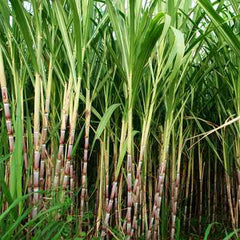Cane Ethanol (Ethyl Alcohol)
Plant-Based Alcohol from Organic Sugar Cane
What Is Cane Ethanol?
Ethanol—also known as ethyl alcohol—is the same type of alcohol found in beer, wine, and spirits. In personal care, ethanol is widely used for its fast-drying, antimicrobial-supporting, and solubilizing properties.
We use organic ethanol made from certified organic, Fair Trade sugar cane, rather than petroleum-derived alcohols. This plant-based source aligns with our commitment to renewable ingredients and responsible sourcing.
Why We Use Ethanol
Ethanol serves very different purposes depending on the product, and its role is always intentional.
Alcohol Hand Sprays
In alcohol-based hand sprays, ethanol is the primary functional ingredient. At sufficiently high concentrations, ethyl alcohol is widely recognized for its ability to inactivate many viruses and microbes on the skin’s surface by disrupting their outer structure.
According to the Centers for Disease Control and Prevention, ethyl alcohol at concentrations of greater than 60% is highly effective against many viruses and germs.
While alcohol may raise concerns for some people, it’s important to understand that alcohol-free hand sprays are not broadly effective against many microbes. For this reason, ethanol remains the most reliable option for hand sprays designed to support cleanliness when soap and water are not available.
Because alcohol can be drying with repeated use, we formulate our hand sprays with skin-supportive ingredients to help keep hands feeling comfortable.
Aromatherapy Shower Mists
In our aromatherapy shower mists, ethanol acts as a carrier and dispersing medium for essential oils. Because these sprays do not contain water, the alcohol allows essential oils to remain evenly distributed while evaporating quickly, releasing aroma into the warm steam of the shower without leaving residue.
In this context, ethanol isn’t solubilizing oils into water—it’s providing a clean, fast-evaporating base that carries aroma effectively and evenly into the air.
Foot Sprays & Bug Sprays
In water-based sprays, such as foot sprays and bug sprays, ethanol plays a different role.
Essential oils do not naturally mix with water. Here, ethanol acts as a natural solubilizer, meaning it helps essential oils disperse evenly throughout the water-based formula rather than separating or floating on the surface. This ensures consistent performance and scent with each use.
Ethanol also helps limit microbial growth in these water-containing sprays, supporting stability without relying on synthetic preservatives.
Fair Trade IBD
 Our ethanol is certified Fair Trade by IBD. Fair Trade IBD (Instituto Biodinâmico for Rural Development) is an international quality mark for organic agriculture, people, and work.
Our ethanol is certified Fair Trade by IBD. Fair Trade IBD (Instituto Biodinâmico for Rural Development) is an international quality mark for organic agriculture, people, and work.
The mission of IBD is to ensure that all trade supports sustainable resource use, environmental protection, and progressive labor standards.
Fair Trade IBD guarantees organic farming and good working conditions for the farmers, and stimulates a fair price for the farmers. Fair Trade IBD is about improving the living conditions of small farmers and increasing self-reliance. For example, attention is paid to the land rights of the indigenous population.
There are numerous other critical criteria required for IBD-certified farms and companies. For example, it is expected that certified enterprises promote environmental conservation and the sustainable management of natural resources.
Conservation and maintenance of native vegetation and wildlife in the production area is required. Deforestation of primary forests is prohibited, as is hunting, capturing, or trading of wild animals or endangered plants. It is forbidden to threaten the shelter environments of animals and plants, especially those threatened. It is also forbidden to release untreated residues into water bodies.
Buyer Beware
Ethyl alcohol (ethanol) is used for many things. Since alcohol is regulated and heavily taxed by the federal government, it is often denatured prior to being sold when used in products that are not consumed in order to avoid paying the excise tax. Denatured ethanol contains additional chemicals called denaturants that make it unfit for human consumption, so people won't drink it.
There are many ways ethyl alcohols are denatured. Unfortunately, some are denatured using harmful and even toxic chemicals that can be absorbed into the skin.
On an ingredient label, denatured alcohol is usually listed as 'denatured alcohol' or more correctly SD (Specially Denatured) Alcohol plus some numbers and letters that refer to the type of denaturant used. For example, SD Alcohol 40-B specifically means the denaturing additives are denatonium benzoate and t-butyl alcohol. If you see this type of ingredient on a label, do a Google search for the ingredient to determine the type of denaturant used.








